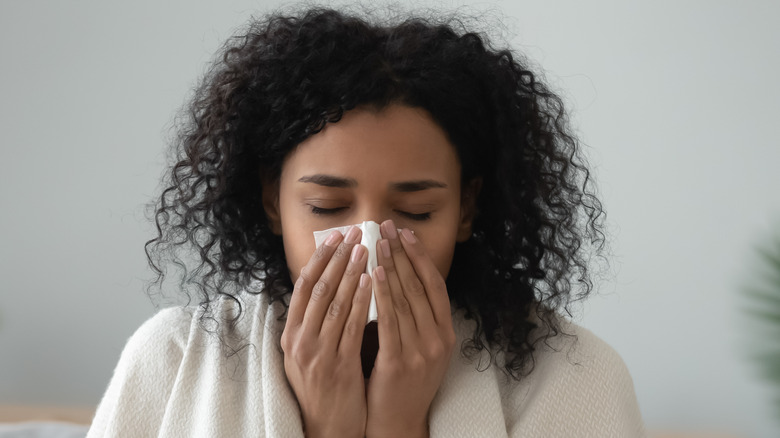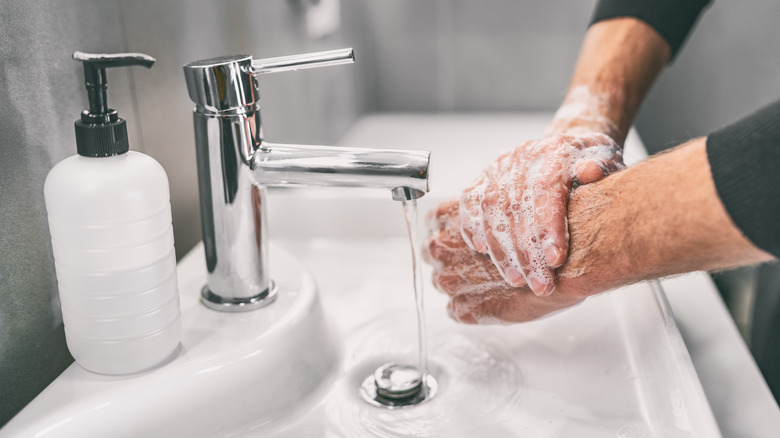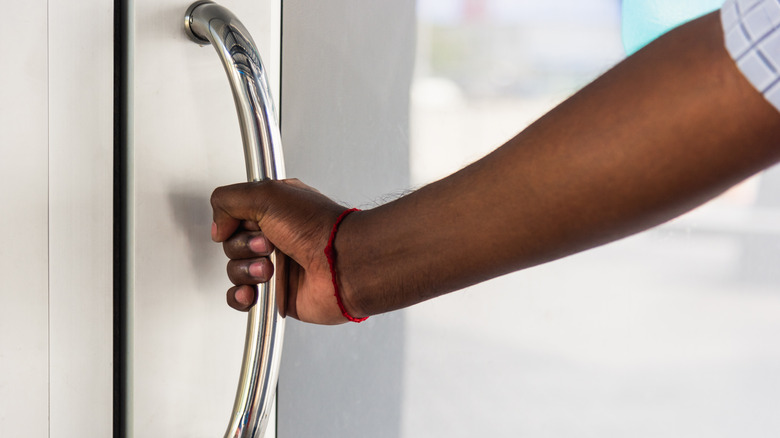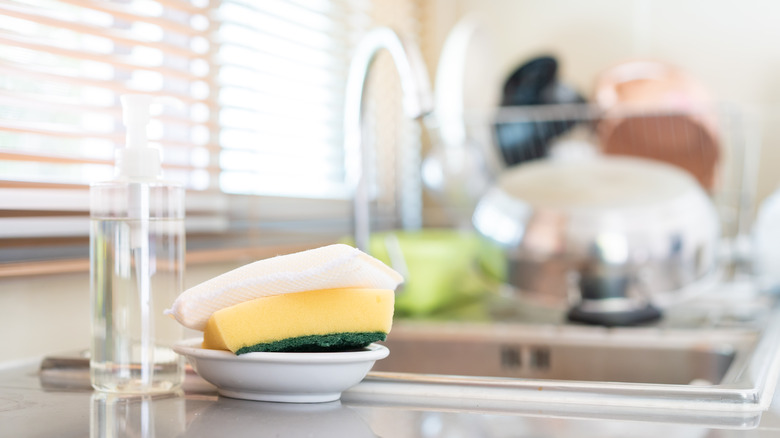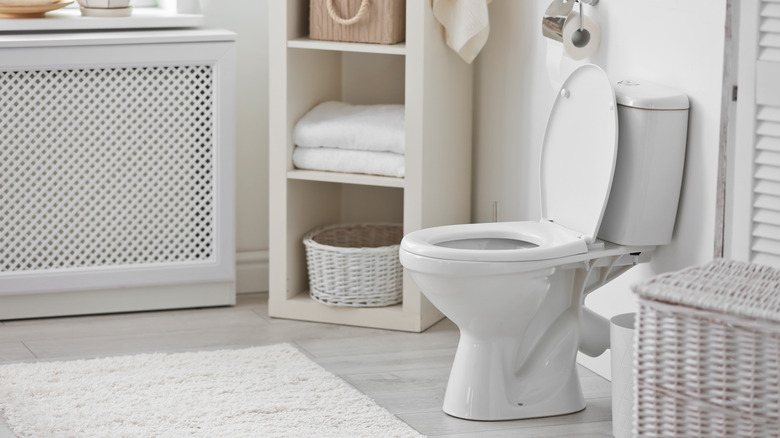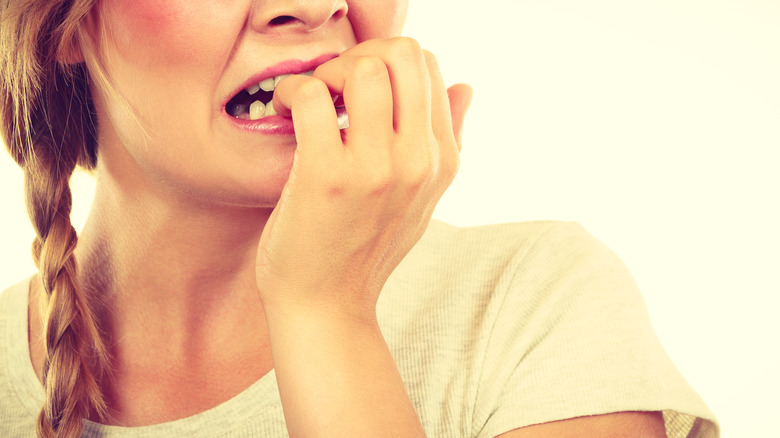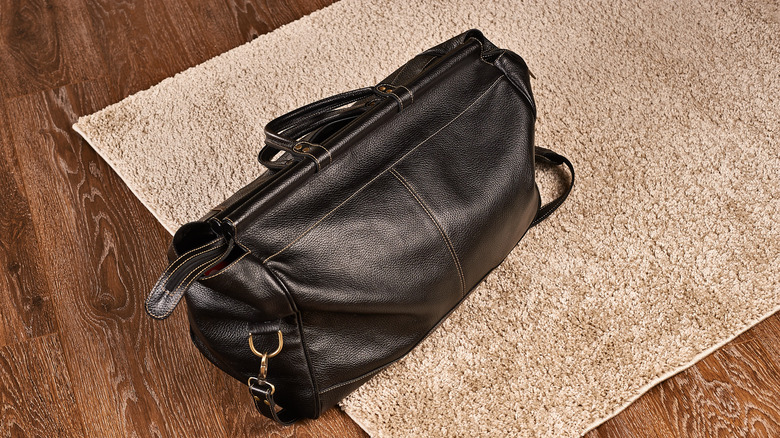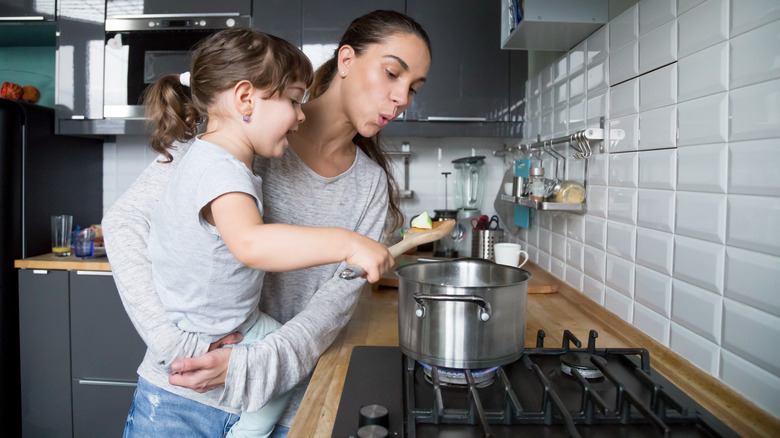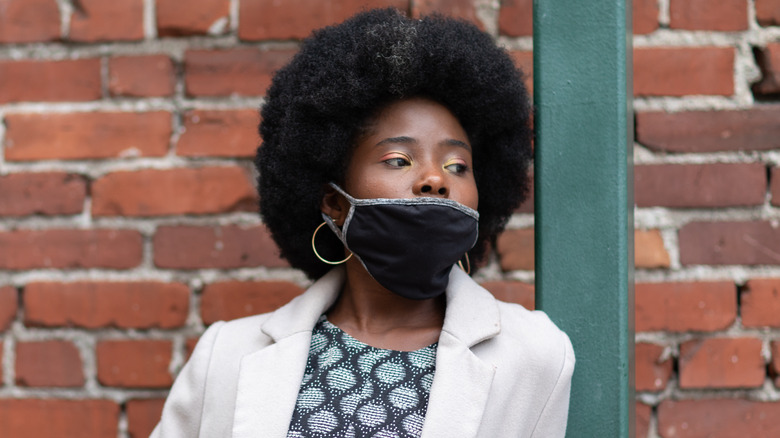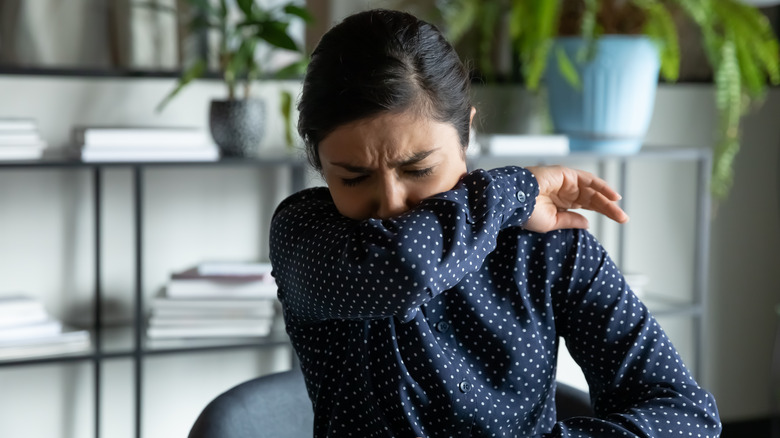Habits That Are Spreading More Germs Than You Realized
These days, germ awareness is more important than ever to help reduce the spread of infectious disease. You probably already know about some of the many things that you can do to keep germs from spreading to others. Health experts recommend washing your hands frequently, covering your mouth and nose when you cough or sneeze, getting recommended vaccines, and staying home when you aren't feeling well (per the CDC).
Healthline suggests a number of additional measures that may protect you from illness. These include eating a nutritious diet, exercising regularly, and getting adequate sleep. Avoiding crowded indoor spaces can also help keep you disease-free. To boost your immune system, you should also consider not smoking, limiting alcohol use, maintaining a healthy weight, and minimizing stress (via Harvard Health).
While some germ-spreading habits are clearly gross, there are others that may not be as obvious. Below, we cover potentially harmful habits that are spreading more germs than you realized.
Not washing your hands properly
Why is handwashing so important? The answer is simple: It saves lives. WebMD explains that if everyone washed their hands as often as they should, we could save a million lives every year. When you don't wash your hands, you pass on potentially harmful germs to friends, family members, co-workers, and even complete strangers. And don't forget about passing on germs to yourself. When you touch your eyes, nose, and mouth with dirty hands, germs from other people and surrounding surfaces can enter your body and make you sick.
You may be able to avoid missing work, school, and other activities by washing your hands often and well. The Mayo Clinic covers some basics on the do's and don'ts of handwashing. You should always wash your hands before: preparing food, eating, treating wounds, caring for someone who is sick, and placing or removing contact lenses. Additionally, go ahead and reach for soap and water after preparing food, using the toilet, changing diapers, assisting a child in the bathroom, coughing, sneezing, blowing your nose, treating wounds, caring for someone who is sick, and handling garbage or pet food. Finally, you should always wash your hands when they appear visibly dirty.
To effectively rid your hands of germs, the Mayo Clinic advises, "Wet your hands with clean, running water — either warm or cold. Apply soap and lather well. Rub your hands vigorously for at least 20 seconds. Remember to scrub all surfaces, including the backs of your hands, wrists, between your fingers and under your fingernails. Rinse well. Dry your hands with a clean towel or air-dry them." When soap and water are unavailable, use an alcohol-based hand sanitizer with at least 60% alcohol.
Coughing or sneezing without covering your nose and mouth
Even when you don't think you're sick, coughing or sneezing without covering your mouth and nose spreads germs. According to the Mayo Clinic, a cough can occur due to allergies, asthma, the common cold, influenza, COVID-19, or a range of other health conditions. If you have not yet received a medical diagnosis, you should isolate immediately, get a COVID-19 test, and contact your doctor as soon as possible.
One important thing to understand is that even an occasional cough or sneeze due to environmental triggers (like dust or dry air) has the potential to spread asymptomatic disease, placing those around you at risk. And you may be surprised to learn just how far your body's droplets can go; National Geographic reports that a sneeze can travel as far as 23 to 27 feet. To help minimize the spread of germs, use a tissue or, when necessary, your sleeve when coughing or sneezing (via Cleveland Clinic). When wearing a mask, avoid taking it off to cough or sneeze. Instead, carry an extra mask with you and store soiled masks in a plastic bag until you are able to dispose of or wash them.
Along with taking measures to prevent spreading germs when coughing or sneezing, you should also follow proper etiquette for nose-blowing –– that is, don't do it in public (via Eat This, Not That!). Instead, excuse yourself to a private location, such as the bathroom, to take care of your business.
Touching common surfaces
Germs do not only pass directly from person to person. When you touch common surfaces like doorknobs, handrails, and elevator buttons, you may be spreading germs to others. You can also infect yourself by first touching a dirty surface, then touching your eyes, mouth, or nose. Inanimate objects that have the potential to spread germs are known as "fomites" among epidemiologists. According to The Conversation, fomites can be "an important pathway for disease transmission" and have been linked to outbreaks of norovirus, smallpox, and SARS.
Research showed that one germy surface can infect half of an office, hotel, or healthcare facility within hours (via CBS News). In the study, samples of a tracer virus called bacteriophage MS-2 were applied to one or two common surfaces at the beginning of the day. Within two to four hours, the virus had spread widely, impacting 40 to 60% of the facility's workers and visitors. To prevent germs from spreading through common surfaces, practice good hand hygiene and clean surfaces frequently with disinfectant wipes.
Preparing food
Pretty much everyone wants to avoid food poisoning. Despite this common desire, there are an estimated 48 million cases of foodborne illnesses each year, per the CDC. WebMD explains that common symptoms include diarrhea, vomiting, and fever. Although many cases are mild, others can land you in the hospital. While raw foods from animals like meat, poultry, eggs, and shellfish are common sources of foodborne illness, fresh fruits and vegetables, particularly sprouts, can also make you sick. Take note that washing produce before eating it may help reduce contagions.
In general, following safe food handling steps can help you avoid germs from spreading in the kitchen. Safety tips from the USDA's Food Safety and Inspection Service include washing hands and surfaces often, keeping raw meat, poultry, and seafood separate to avoid cross-contamination, cooking meats and poultry to a safe internal temperature, and refrigerating foods promptly to prevent the growth of harmful bacteria.
Using dirty sponges and towels
To avoid cross-contamination in the kitchen, you'll need to keep your hands and surfaces as clean as possible. However, if you're reaching for a kitchen sponge to clean, we want you to be aware that it is probably full of germs. Food microbiologist Jennifer Quinlan revealed the safest ways to use sponges, telling NPR to keep your sponge away from raw meat and juices, replace them every one to two weeks, and clean your current sponge every few days.
You can disinfect a sponge by running it through the dishwasher on a heated dry cycle, or wetting it and placing it in the microwave for one minute. Better yet, suggests an article in Time, avoid using kitchen sponges entirely. Instead, sanitize your dishes and utensils in the dishwasher on a full energy cycle. If there are items requiring hand washing, use a plastic or silicone brush.
Another kitchen habit that may be spreading more germs than you realize is not using clean towels. On the dish front, there's really no point in cleaning them if you use a dirty towel to dry them afterward. The same goes for your hands. Reader's Digest reports that the most hygienic way to dry hands is with disposable paper towels, though other methods of drying (clean cloth towels or air dryers) are preferable over none at all.
Using your phone
These days, people carry their phones with them everywhere –– to the store, to the gym, and even to the bathroom. It probably won't come as a surprise that phones are full of germs; however, you may be shocked to discover just how dirty they are. USA Today reports that smartphones are seven times dirtier than a toilet. As if that's not disgusting enough, a 2011 British study from the London School of Hygiene and Tropical Medicine showed that one in six cell phones are contaminated with fecal matter.
Fortunately, you've got options. First of all, most health experts recommend cleaning your phone daily. The Centers for Disease Control and Prevention recommends using 70% alcohol disinfectant to get the job done (via Medical News Today).
It may also be helpful to avoid using your phone when outside of home or only touching it after sanitizing your hands. You can use earbuds (or headphones) when making calls so that you don't need to hold the phone up to your face. Just remember never to share earbuds with a friend; they can trap wax in the ears, causing potentially harmful bacteria growth that can be passed along to others (per Buzzfeed).
Caring for young children
To keep the whole family healthy, parents and other caregivers should take precautions when changing diapers and potty training children. WebMD advises choosing a designated location, being prepared with supplies, wiping carefully, rolling up and resealing dirty diapers, and using a diaper pail. While washing your own hands afterwards is probably a no-brainer, don't forget to also wash your baby's hands. Even your perfect bundle of joy can spread germs.
When it comes to safer toilet training, Childcare Extension suggests using a potty seat that attaches to the toilet instead of a potty chair. If you need to use a potty chair, it must be emptied and thoroughly sanitized after each use. Wear gloves if your child needs assistance wiping, and remind your child to wash their hands after using the toilet.
The American Academy of Pediatrics reminds families that a little cleaning each day can go a long way towards protecting your child's health. Wash toilets, sinks, and other bathroom surfaces with hot, soapy water, then use a household bleach solution or other disinfectant for additional cleaning. Don't forget the diaper changing area, and always keep cleaning products stored out of reach from young children.
Caring for pets
We know that infectious diseases can transfer from human to animal, and from animal to human. According to the CDC, at least six of 10 known infectious diseases, along with 3 of 4 new or emerging ones, are spread from animals to people (via Premier Health). Germs can spread between species through direct contact, common surfaces and environments, "vector-borne bites" (for example, mosquito or tick bites), and foodborne illnesses.
Even a small scratch from your beloved kitten can cause cat-scratch fever, while changing kitty litter can lead to toxoplasmosis. Improperly picking up after your dog along with petting farm animals can also make you sick. Although anyone can become ill, children under age five, pregnant women, and those with underlying medical conditions are considered most at risk, according to Premier Health.
So, how can you keep everybody safe? While avoiding contact with wild animals may be prudent, this probably isn't an option when it comes to pets and farm animals. Instead, always wash your hands after interacting with animals and their environments and do your best to avoid animal scratches, along with bites from animals and insects. Finally, consider keeping your pets away from the kitchen, and store their supplies other than the kitchen or bathroom.
Flushing the toilet
While there is much debate over whether it is necessary to flush the toilet every time you go, it is reasonably clear that flushing the toilet can spread germs. A 2013 research study in the Elsevier Public Health Emergency Collection examined "evidence regarding toilet plume bioaerosol generation and infectious disease transmission.' In other words, does a toilet flush spread disease through aerosols? The researchers conclude that toilet plume (defined by MIT Medical as "airborne dispersal of microscopic particles created by the flush of a toilet") could contribute to the transmission of infectious disease.
MIT Medical explained that the risk of being infected with COVID-19 is very minimal from a toilet flush. Still, they generally recommend a "flush and rush" approach when using a public toilet. (Just remember to wash your hands on your way out!) Additionally, you may want to close the lid before flushing, along with moving nearby objects (especially your toothbrush!) away from the toilet. Dentist Greg Grillo told Medical Daily, "Germs can travel through the air when flushing and end up on your toothbrush, even when the toilet lid is closed." Yuck!
Putting objects in your mouth
Do you tend to bite your nails, chew on the ends of pens, or open items with your teeth? All of these habits can spread harmful germs. Let's start by discussing your nails, which are tiny hotbeds for dirt and grime. According to MedExpress, biting your nails gives germs a "direct, non-stop, all-expenses paid trip straight to your mouth." From there, bacteria and viruses can travel to your digestive system and cause diarrhea and vomiting, or lead to seasonal flu, strep throat, and other diseases.
According to Marie Claire, 20% of office workers have the nervous habit of chewing on pens. Pens, of course, are handled by germy hands –– and not necessarily just your own. When you put a pen in your mouth, those germs can transfer to the inside of your body and lead to disease. You can reduce your risk by not sharing writing utensils.
Using your teeth as tools to open packaging is another germ-spreading habit to avoid. Along with directly transferring germs from the package into your mouth, this habit can cause cuts to the gum, lip, and mouth that may be pathways for infection (via Wark Dental Group). Additionally, using your teeth to pop bottle caps, carry things when your hands are full, and nibble on non-food items can cause serious damage to your pearly whites.
Placing your purse on the floor
Although some believe that placing your purse on the floor shows a disrespect for money and will ultimately lead to bad financial luck, there are also other reasons to hang your bag on a hook (via Luxe Link). For one, your purse can be a magnet for germs. A 2015 study in the Journal of Advanced Biomedical Research found that 95.2% of wallets and purses tested contained bacteria.
Just think of the places where you set your purse down each day: your grimy desk drawer, the floor of public bathrooms, the trunk of your car, your kitchen counter. Yet all day long, you are closely interacting with your bag and potentially transferring germs to yourself and others. You can reduce the number of germs that you're quite literally carrying around by washing your hands frequently, disinfecting your purse daily, and hanging your purse on a hook.
Blowing on other people's food
When you stop to think about it, blowing on other people's food is pretty gross. Whether you are blowing out birthday candles or cooling down your child's hot soup, you may want to rethink these germ-spreading habits.
A 2017 study in the Journal of Food Research explored the potential dangers of blowing out candles on a cake, concluding that icing which had been blown on had 1,400% more bacteria than icing which had not been blown on. In other words, bacteria and other microorganisms from the person blowing the candles is likely to be transferred to those eating cake.
Blowing on other types of food, especially for babies and young children, is another common habit that should be avoided. One reason for this, Yahoo News explains, is that "cavities can actually be contagious." The article describes an Australian study's findings that babies and toddlers can get a bacteria called Streptococcus mutans from their mothers even before they have teeth. This type of bacteria may eventually lead to cavities. Streptococcus mutans can be spread through saliva when parents blow on their child's food, share utensils, and kiss them on the mouth.
Not wearing masks properly
Wearing a mask properly can help protect yourself and others from the spread of COVID-19, including the delta variant. It can also help prevent colds, influenza, and even allergies (per Yale Medicine). According to the CDC, the best face masks are those with at least two layers of washable, breathable fabric that completely cover your mouth and nose, fit snugly against the side of your face with no gaps, and have a nose wire to ensure air doesn't leak out of the top.
It is important that both your mouth and nose are completely covered by your mask. While we've probably all seen people with their noses sticking out of masks, the reality is that harmful germs can spread from both orifices and infect others. Additionally, leaving your nose uncovered also places you at increased risk for infection (via WebMD). If you feel uncomfortable when wearing a mask, try different types and fabrics until you find one that works for you.
NPR recommends washing your hands before and after putting on or taking off your mask, storing the mask in a clean, dry place, and washing regularly in hot water. Afterwards, use a heated cycle for drying. If you use disposable masks, replace your mask when it is "visibly soiled or damaged," per Johns Hopkins Medicine.
Going anywhere sick
Perhaps the best thing you can do to prevent spreading more germs than you realize is to stay home when you are sick (via CDC). Staying home can also provide an opportunity for rest so that you can get better faster. In the case of cold or flu, it has generally been advised to stay home for at least 24 hours after a fever is gone without the aid of fever-reducing medications. If you don't have a fever but have other symptoms like cough, body aches, stuffy nose, sore throat, vomiting, or diarrhea, standard recommendations have been to stay away from others for at least four to five days after symptom onset.
Unfortunately, the COVID-19 pandemic has complicated these long-standing guidelines. If you have symptoms like cough, fever, or shortness of breath, it is important to isolate immediately and get tested as soon as possible.
If you are vaccinated against COVID-19 and have been in close contact with someone who has tested positive, you do not need to isolate unless you show symptoms. However, the CDC recommends getting tested three to five days after exposure and wearing a mask around others for 14 days. If you are unvaccinated and have been exposed to COVID-19, you should plan to stay home for 14 days following initial exposure. During this time, remain separated from other household members when possible. Depending on local health guidelines, you may be able to shorten your quarantine period if you remain symptom-free with a negative test result.

